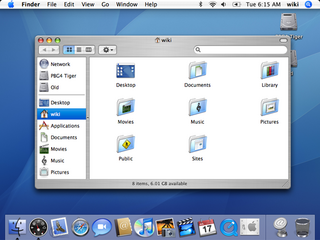Related Research Articles
QuickTime is a discontinued extensible multimedia architecture created by Apple, which supports playing, streaming, encoding, and transcoding a variety of digital media formats. The term QuickTime also refers to the QuickTime Player front-end media player application, which is built-into macOS, and was formerly available for Windows.
Carbon was one of two primary C-based application programming interfaces (APIs) developed by Apple for the macOS operating system. Carbon provided a good degree of backward compatibility for programs that ran on Mac OS 8 and 9. Developers can use the Carbon APIs to port (“carbonize”) their “classic” Mac applications and software to the Mac OS X platform with little effort, compared to porting the app to the entirely different Cocoa system, which originated in OPENSTEP. With the release of macOS 10.15 Catalina, the Carbon API was officially discontinued and removed, leaving Cocoa as the sole primary API for developing macOS applications.
Audio Interchange File Format (AIFF) is an audio file format standard used for storing sound data for personal computers and other electronic audio devices. The format was developed by Apple Inc. in 1988 based on Electronic Arts' Interchange File Format and is most commonly used on Apple Macintosh computer systems.

iMovie is a free video editing application made by Apple for the Mac, the iPhone, and the iPad. It includes a range of video effects and tools like color correction and image stabilization, but is designed to be accessible to users with little or no video editing experience. iMovie's professional equivalent is Apple's Final Cut Pro X.

Mac OS X Tiger is the 5th major release of macOS, Apple's desktop and server operating system for Mac computers. Tiger was released to the public on April 29, 2005 for US$129.95 as the successor to Mac OS X 10.3 Panther. Included features were a fast searching system called Spotlight, a new version of the Safari web browser, Dashboard, a new 'Unified' theme, and improved support for 64-bit addressing on Power Mac G5s. Mac OS X 10.4 Tiger also had a number of additional features that Microsoft had spent several years struggling to add to Windows with acceptable performance, such as fast file searching and improved graphics processing.
The Apple Lossless Audio Codec (ALAC), also known as Apple Lossless, or Apple Lossless Encoder (ALE), is an audio coding format, and its reference audio codec implementation, developed by Apple Inc. for lossless data compression of digital music. After initially keeping it proprietary from its inception in 2004, in late 2011 Apple made the codec available open source and royalty-free. Traditionally, Apple has referred to the codec as Apple Lossless, though more recently it has begun to use the abbreviated term ALAC when referring to the codec.

The AirPort Express is a discontinued Wi-Fi base station product from Apple Inc., part of the AirPort product line. While more compact and in some ways simpler than another Apple Wi-Fi base station, the AirPort Extreme, the Express offers audio output capability the Extreme lacks. The AirPort Express was the first AirPlay device to receive streamed audio from a computer running iTunes on the local network. AirPort Express outperforms the stringent requirements of the ENERGY STAR Program Requirements for Small Network Equipment (SNE) Version 1.0.
The following comparison of video players compares general and technical information for notable software media player programs.
3GP is a multimedia container format defined by the Third Generation Partnership Project (3GPP) for 3G UMTS multimedia services. It is used on 3G mobile phones but can also be played on some 2G and 4G phones.
These tables compare features of multimedia container formats, most often used for storing or streaming digital video or digital audio content. To see which multimedia players support which container format, look at comparison of media players.
In the macOS, iOS, NeXTSTEP, and GNUstep programming frameworks, property list files are files that store serialized objects. Property list files use the filename extension .plist, and thus are often referred to as p-list files.
QuickTime File Format (QTFF) is a computer file format used natively by the QuickTime framework.
The following tables compare general and technical information for a variety of audio coding formats.
Flip4Mac from Telestream, Inc. was a digital media software for the macOS operating system. It was known for being the only QuickTime component for macOS to support Windows Media Video, and was distributed by Microsoft as a substitute after they discontinued their media player for Macintosh computers.

Logic Studio is a discontinued professional music production suite by Apple Inc. The first version of Logic Studio was unveiled on September 12, 2007. It claims to be the largest collection of modeled instruments, sampler instruments, effect plug-ins, and audio loops ever put in a single application.

Mac Mini is a small form factor desktop computer developed and marketed by Apple Inc. As of 2022, it is positioned between the consumer all-in-one iMac and the professional Mac Studio and Mac Pro as one of four current Mac desktop computers. Since launch, it has shipped without a display, keyboard, and mouse. The machine was initially branded as "BYODKM" as a strategic pitch to encourage users to switch from Windows and Linux computers.

EPUB is an e-book file format that uses the ".epub" file extension. The term is short for electronic publication and is sometimes stylized as ePub. EPUB is supported by many e-readers, and compatible software is available for most smartphones, tablets, and computers. EPUB is a technical standard published by the International Digital Publishing Forum (IDPF). It became an official standard of the IDPF in September 2007, superseding the older Open eBook (OEB) standard.

Opus is a lossy audio coding format developed by the Xiph.Org Foundation and standardized by the Internet Engineering Task Force, designed to efficiently code speech and general audio in a single format, while remaining low-latency enough for real-time interactive communication and low-complexity enough for low-end embedded processors. Opus replaces both Vorbis and Speex for new applications, and several blind listening tests have ranked it higher-quality than any other standard audio format at any given bitrate until transparency is reached, including MP3, AAC, and HE-AAC.
Apple File System (APFS) is a proprietary file system developed and deployed by Apple Inc. for macOS Sierra (10.12.4) and later, iOS 10.3, tvOS 10.2, watchOS 3.2, and all versions of iPadOS. It aims to fix core problems of HFS+, APFS's predecessor on these operating systems. APFS is optimized for solid-state drive storage and supports encryption, snapshots, and increased data integrity, among other capabilities.
References
- ↑ "How to Convert CAF to MP3". TechiSky. August 25, 2012. Retrieved 2012-11-27.
- ↑ "Apple Core Audio Format Specification 1.0/ CAF File Overview". Mac Developer Library. Apple Inc. 2011 [2005]. Retrieved 2012-11-27.